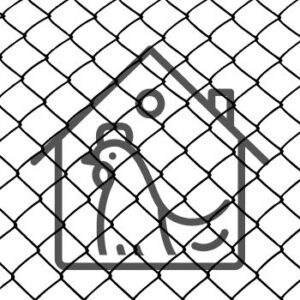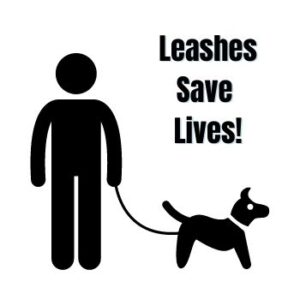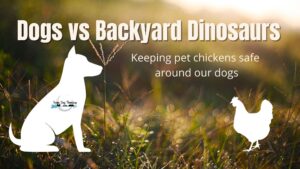Dogs vs. Backyard Dinosaurs: Keeping pet chickens safe with dogs
This past week the rescue I work with was contacted by two different people to take in dogs who were attacking/harassing/killing chickens. We were able to help them thankfully, but in reflection I feel very sad for these two otherwise delightfully sweet dogs. They were simply doing what dogs do.
With the pandemic came a lot of changes for our world, one of which was the rise of backyard chickens. Or backyard dinosaurs as I like to call them. I have had chickens in my backyard for years, I absolutely adore them, and someday should film training them using the same methods I use on dogs and horses (ducks, and pigs too apparently!) And as delightful as backyard chickens can be, they do pose a challenge when it comes to our dogs.
Many owners are finding a sudden problem of their dogs wanting to mess with their chickens. Many of these dogs were not raised around chickens, and now are faced with the challenge of ignoring their instincts and not chasing the flightless birds hanging out on the lawn. And owners are facing the reality that their sweet, wonderful dogs might pose a threat to their equally wonderful chickens.
So what are we to do? How do we maintain the safety of our flocks in the presence of a predator? Except in this case the predator is Fido, our family golden retriever.
Can dogs and chickens coexist?
Absolutely! But there are some things we need to understand about dog behavior, and chicken behavior though. The first is that dogs are opportunistic predators. And chickens are prey. Not only that, chickens behave like prey: they tend to flap off, making noise and running when startled. Which can easily excite the prey drive in a dog, even in our softest, most mellow and fluffy of pups. This can also cause other problems if the dog catches the chickens, stress to the birds, injury or even death. And as such knowing what to do to help our dogs and chickens coexist is important to keeping everyone safe and happy. We have to acknowledge this reality, and understand that it is something that will always color our are dogs and chickens interact. This is not a problem for dogs, after all it is what dogs do, and we very rarely condemn dogs for chasing squirrels.
Management:
It is rare that you will find a dog who is more willing to leave the chickens alone than chase them. I am more surprised by dogs who ignore the chickens, then I am by dogs who are willing to do chickens harm. As mentioned above, dogs are predators and will behave the way predators do. So our first line of defense in protecting our chickens is management.
A secure chicken coop and run is paramount. Having a safe space with plenty of room to secure your chickens is not only good husbandry, it is the best way to keep your chickens safe from all kinds of threats. Hawks, raccoons, foxes will all cross through suburban environments for an easy drive thru meal of a pet chicken. Your chicken run should have some kind of roofing, either a solid roof or a wire roof that provides protection from above. But when you have a dog in the yard you should also reinforce the fencing around the run, and a way to keep the bottom of the run from being dug under. At my tiny urban homestead I have cinder blocks around the base of my run, and I have wrapped hog panels outside the chicken wire that makes the bulk of the fencing system. These hog panels are designed to keep very large pigs in place, and since they are very sturdy they are the perfect defense from dogs pushing on the chicken wire inside and weakening my fence. The cinder blocks are there to keep the dogs from digging at the fence and creating holes to stick heads through. At my house one of my dogs will absolutely cause the chickens harm if he gets too close to them, when they dogs are in the yard the chickens are secure in their run. I took special care in raising my hens to train them to “kennel up” on cue.
Having a safe space with plenty of room to secure your chickens is not only good husbandry, it is the best way to keep your chickens safe from all kinds of threats. Hawks, raccoons, foxes will all cross through suburban environments for an easy drive thru meal of a pet chicken. Your chicken run should have some kind of roofing, either a solid roof or a wire roof that provides protection from above. But when you have a dog in the yard you should also reinforce the fencing around the run, and a way to keep the bottom of the run from being dug under. At my tiny urban homestead I have cinder blocks around the base of my run, and I have wrapped hog panels outside the chicken wire that makes the bulk of the fencing system. These hog panels are designed to keep very large pigs in place, and since they are very sturdy they are the perfect defense from dogs pushing on the chicken wire inside and weakening my fence. The cinder blocks are there to keep the dogs from digging at the fence and creating holes to stick heads through. At my house one of my dogs will absolutely cause the chickens harm if he gets too close to them, when they dogs are in the yard the chickens are secure in their run. I took special care in raising my hens to train them to “kennel up” on cue.
 The second phase of management is the age old, tried and true best practice for keeping dogs safe: a leash. Yep! When in doubt: leash up. Leashes are an important part of managing the situation to keep your chickens safe, and your dog from making poor choices. Here at the River Hawk Homestead when a dog needs to go potty, but the birds are out in the backyard enjoying their bug patrol duties, I take the dog out on a long leash to go potty. This allows me to really reinforce their good behavior of ignoring and disengaging from the birds, as well as keep them from getting too close and making a poor choice with the birds.
The second phase of management is the age old, tried and true best practice for keeping dogs safe: a leash. Yep! When in doubt: leash up. Leashes are an important part of managing the situation to keep your chickens safe, and your dog from making poor choices. Here at the River Hawk Homestead when a dog needs to go potty, but the birds are out in the backyard enjoying their bug patrol duties, I take the dog out on a long leash to go potty. This allows me to really reinforce their good behavior of ignoring and disengaging from the birds, as well as keep them from getting too close and making a poor choice with the birds.
Training:
The next step in dog and chicken cohabitation is that favorite word: training. We want to work with our dogs very quickly as the birds come home. I teach a strong, and well reinforced “leave it.” But I also train my dogs (on a long line) in the yard with the birds to do mat/stationing behaviors. Teaching them to maintain a comfortable position on a platform or a mat while the birds are about. Both of these behaviors will go a long way to helping your dog know what is expected of them when the chickens are around.
The final training piece is a rock solid recall. Being able to call my dog back to me and direct their focus to appropriate items is key to harmonious living with birds. I want to make sure I can ask my dog to walk away from the birds of their own accord, and easily give them an appropriate alternative to chasing my birds.
In conclusion: Yes dogs and chickens can live together. But that picture may not look like the bucolic image of a dogs sniffing in the yard with chickens milling about. For many dogs it will look like good management and ongoing training practices to keep the birds safe, and the dog's safe from their own less than desirable impulses. And if you find yourself overwhelmed; reach out! I have a lot of experience with chickens and with dogs (obviously) and I am happy to help guide you! You can even get a consult on how to train your chickens to recall and kennel up on cue! (My behavior consulting is not limited to canines!)

